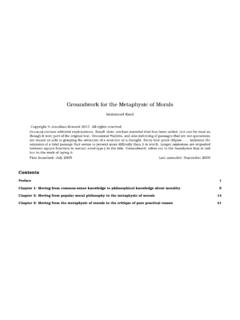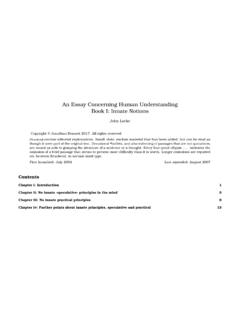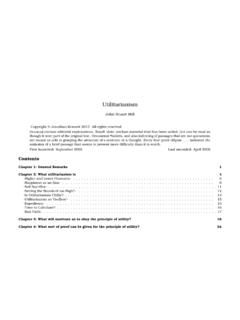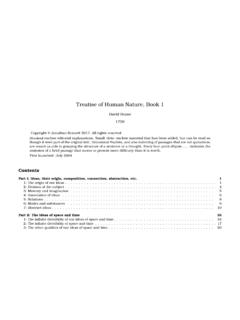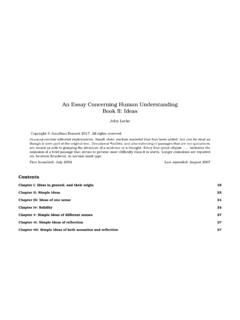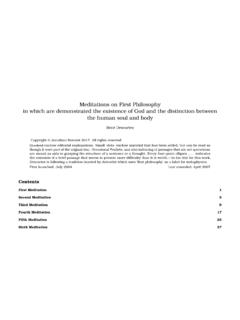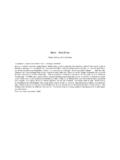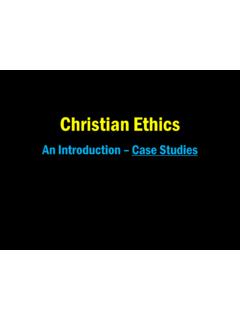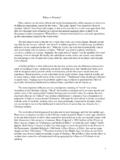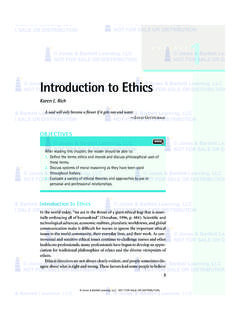Transcription of An Introduction to the Principles of Morals and …
1 An Introduction to the Principles of Morals and LegislationJeremy BenthamCopyright Jonathan Bennett 2017. All rights reserved[Brackets]enclose editorial explanations. Small dots enclose material that has been added, but can be read asthough it were part of the original text. Occasional bullets, and also indenting of passages that are not quotations,are meant as aids to grasping the structure of a sentence or a thought. Every four-point ellipsis .. indicates theomission of a brief passage that seems to present more difficulty than it is worth.
2 Longer omissions are reportedbetween brackets in normal-sized type. The numbering of paragraphs in small bold type is Bentham s. TheFirst Edition of this work wasprivately printedin 1780 and firstpublishedin 1789. The present version is basedon A New Edition, corrected by the Author [but not changed much], published in launched:ContentsPreface (1789)1 Chapter 1: The Principle of Utility6 Chapter 2: Principles opposing the Principle of Utility10 Chapter 3: The Four Sanctions or Sources of Pain and Pleasure20 Chapter 4: Measuring Pleasure and Pain22 Chapter 5: The Kinds of Pleasure and Pain24 Chapter 6: Circumstances influencing Sensibility29 Principles of Morals and LegislationJeremy BenthamChapter 7.
3 Human Actions in General44 Chapter 8: Intentionality50 Chapter 9: Consciousness53 Chapter 10: Motives561. Different senses of motive ..562. No motives constantly good or constantly bad ..583. Matching motives against pleasures and pains ..604. Order of pre-eminence among motives ..695. Conflict among motives ..72 Chapter 11: Human Dispositions in General73 Chapter 12: A harmful Act s Consequences841. Forms in which the mischief of an act may show itself .. 842. How intentionality etc. can influence the mischief of an act.
4 90 Chapter 13: Cases not right for Punishment931. General view of cases not right for punishment ..932. Cases where punishment is groundless .. 943. Cases where punishment must be ineffective .. 944. Cases where punishment is unprofitable ..965. Cases where punishment is needless ..96 Chapter 14: The Proportion between Punishment and Offences97 Chapter 15: The Properties to be given to a Lot of Punishment102 Chapter 16: Classifying Offences1091. Five Classes of Offences .. 1092. Divisions and sub-divisions of them.
5 1113. Further subdivision of Class 1: Offences Against Individuals .. 1204. Advantages of this method .. 1385. Characters of the five classes .. 140 Principles of Morals and LegislationJeremy BenthamChapter 17: The Boundary around Penal Jurisprudence1431. Borderline between private ethics and the art of legislation .. 1432. Branches of jurisprudence .. 150 Material added nine years later153 Principles of Morals and LegislationJeremy BenthamGlossaryaffection:In the early modern period, affection couldmean fondness , as it does today; but it was also oftenused, as it is in this work, to cover every sort of pro or conattitude desires, approvals, likings, disapprovals, dislikings, :In Bentham s time an art was any human activity thatrequires skill and involves techniques or rules of procedure.
6 Arts in this sense include medicine, farming, painting, of the work:This phrase, as it occurs on pages 96,120 and 139, reflects the fact that Bentham had plannedthe present work as a mere Introduction to something muchbigger, the body of the work. See the note on page teris paribus: Latin = other things being :whim; think of it in terms of the cognate adjective, capricious .difference:A technical term relating to definitions. To define(the name of) a kind K of thing by genus and difference isto identify some larger sort G that includes K and add D the difference that marks off K within G.
7 Famously, a Khumanbeingis an Ganimalthat is Drational. The Latindifferentiawas often used :In early modern times this word had a somewhatbroader meaning than it does today. It wouldn t have beenmisleading to replace it by upbringing on almost everyoccasion. See especially18on page :Insomeof its uses in this work, as often in earlymodern times, event means outcome , result . Shakespeare: I ll after him and see the event of this. evil:This noun means merely something bad . Don t load itwith all the force it has in English when used as an adjective( the problem of evil merely means the problem posed bythe existence of bad states of affairs ).
8 Bentham s half-dozenuses of evil as an adjective are replaced in this version by hismore usual bad , as he clearly isn t making any :This means arouse or cause ; our present notionofexcitementdoesn t come into it. An exciting cause inBentham s usage is just a cause; he puts in the adjective,presumably, to mark it off from final cause , which meant purpose or intention or the like, though in fact he uses final cause only once in this :When Bentham speaks of a punishment as being too expensive he means that it inflicts too much sufferingfor the amount of good it does.
9 See the editorial note onpage :Having to do with a :Existing only as an idea, fictional, unreal, or :Neither good not :When Bentham calls a mental event or percep-tion interestinghe means that it hooks into theinterestsofthe person who has it: for him it isn t neutral, is in someway positive or negative, draws him in or pushes him :Highly responsive, physically or mentally, :In Bentham s usage, a lot of pleasure, of pain, ofpunishment etc. is an episode or dose of pleasure, pain,etc. There is no suggestion ofa large of Morals and LegislationJeremy Benthamlucre:In a now obsolete sense, greed for profit or gain (OED).
10 Magistrate:In this work, as in general in early moderntimes, a magistrate is anyone with an official role in gov-ernment. The phrase the magistrate in page 40 refers to the whole legal=judicial system or tothose who operate :When on page 44 Bentham speaks of conse-quences that are material he means consequences thatmatter. He uses the phrase material or important .member:Any part or organ of an organic body (not nec-essarily a limb). When on page 7 Bentham writes of acommunity as a fictitious body composed of the individualswho are.
